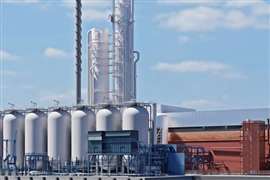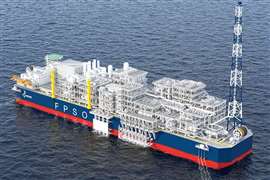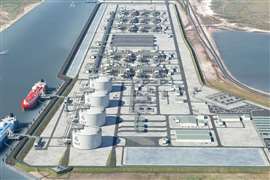Northern Lights injects first CO₂ into North Sea storage site
August 25, 2025
Company begins operations, prepares for expansion to 5 million tonnes annually
Northern Lights JV said it has a major milestone with the injection and storage of the first volumes of carbon dioxide into the Aurora reservoir, located 2,600 meters beneath the Norwegian North Sea.
The CO₂ was transported through a 100-kilometer pipeline to the offshore storage site, marking the official start of operations for the cross-border carbon capture and storage (CCS) initiative.
 Northern Lights injects first CO₂ into North Sea storage site. (Image: Northern Lights)
Northern Lights injects first CO₂ into North Sea storage site. (Image: Northern Lights)
“We have reached an exciting milestone: We now injected and stored the very first CO₂ safely in the reservoir. Our ships, facilities and wells are now in operation,” said Tim Heijn, managing director of Northern Lights JV.
The project will transport and store CO₂ from Norwegian industrial facilities during the remainder of 2025. Volumes from Denmark and the Netherlands are expected to be added in 2026 as part of an effort to create a commercial CCS market in Europe. Northern Lights has developed an open, ship-based infrastructure designed to move captured CO₂ to an onshore receiving terminal in western Norway. From there, the gas is piped to the Aurora reservoir for permanent storage.
Part of Norway’s Longship CCS initiative
The first phase of Northern Lights forms the transport and storage component of Longship, Norway’s full-scale CCS project. The completed infrastructure includes facilities to handle an initial capacity of 1.5 million tonnes per year. Operations began in summer 2025, and the joint venture has announced plans to expand storage capacity to at least 5 million tonnes annually through a commercially based investment supported by the EU Connecting Europe Facility (CEF) funding scheme.
Northern Lights is owned by Equinor, TotalEnergies and Shell. It will be the first company to deliver CO₂ transport and storage as a service across national borders in Europe.
Expansion project moves forward
In March, Northern Lights made a final investment decision for its expansion phase after signing a commercial agreement with Stockholm Exergi. The upgrade will include additional onshore storage tanks, pumps, a new jetty, more injection wells, and an expanded fleet of CO₂ transport vessels.
“We are excited to continue building additional capacity following the positive investment decision for the second phase,” Heijn said.
The expansion will leverage existing infrastructure to accommodate growing demand for CCS from European industries. Northern Lights already has signed agreements with Yara in the Netherlands, Ørsted in Denmark, and Stockholm Exergi in Sweden, in addition to serving Heidelberg Materials’ Brevik cement plant and Hafslund Celsio’s waste-to-energy facility in Oslo.
Building a commercial CCS market
Northern Lights’ goal is to enable industrial emitters in Europe to reduce and remove emissions by providing CO₂ transport and permanent offshore storage as a service. Liquefied CO₂ is shipped from capture sites to Norway, where it is stored in the Aurora reservoir beneath the seabed.
The joint venture aims to position itself at the center of a growing market for CCS solutions in Europe, where cross-border cooperation and flexible infrastructure are seen as critical to meeting climate goals.
MAGAZINE
NEWSLETTER

CONNECT WITH THE TEAM










